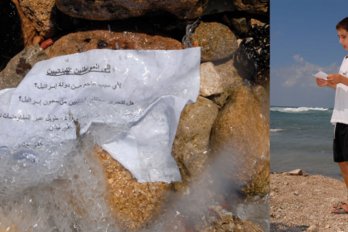olailony — “I would be very willing to stay with him, on the condition that he leaves his many wives,” Evelyn Amony says, dropping her chin to her chest. She pauses before her next admission, waiting for her daughters Bakita, ten, and Mercy, two, to slip out of earshot and into the scorching sun. “Bakita loves her dad so much,” she whispers. “If there’s a chance for us all to be together, I would do it for Bakita.”
Bakita’s dad isn’t a father in the traditional sense, though, and not only because of his numerous wives. He is Joseph Kony, commander of the Lord’s Resistance Army (lra), a group responsible for countless acts of mutilation and murder during a twenty-year campaign against the Ugandan government, and for the abduction of an estimated 38,000 children, of whom Evelyn, now twenty-four, was once one.
Evelyn is sitting with us in a rented clay hut in Olailony, a small community on the southern edge of northern Uganda’s largest urban centre, Gulu. Mercy races back inside, her bare feet slapping the yellowed sheet of linoleum that covers the concrete floor. This is the first linoleum floor I’ve come across in all my time in this region, and the first hut to house a chair, a sofa, and a framed bed. I let the almost shocking luxuries pass without comment as Mercy tugs the water bottle out of my left hand, then marches back toward the light. Her aim is clear: to get rid of the collection of toddlers who have been taking in our visit from the open door. Our photographer, Colin, describes her best: “That is one tiny, cranky grandmother.”
Mercy’s first motion is a kick to the chin of a boy who looks to be at least five. She follows that with a reckless swipe of the water bottle that catches a few heads. No one raises a hand to Kony’s daughter.
Evelyn was twelve when the lra raided her village of Kirombe, just south of the Sudanese border. Soldiers pulled her out of her hut in broad daylight and set her off on a three-month journey north. “That first night, all I did was cry,” she says. “They tied us with ropes and left us under a tree. They told us that if we wanted to die, we should untie the ropes. One boy tried to escape and he was killed right in front of us.” Her usually composed face turns cold, and she looks away.
When they arrived at the lra’s home base in southern Sudan, Evelyn was given the task of babysitting the children of Kony’s twenty-five-plus wives. She was initiated with daily beatings from the elder wives, but they stopped the day Kony witnessed the violent attacks. “He stepped in,” Evelyn explains, lifting Mercy off the floor and onto her knee. “There was no courtship, no acceptance. Right there he said I was his wife.”
“That very night we had sex,” she adds. Evelyn spent ten years as Kony’s wife, becoming one of only five who had access to his private three-room home. She bore three children during this time (the oldest, Fatuma, got lost during a battle between the lra and Ugandan government forces, and Evelyn hasn’t seen her since). “I knew who Kony was and what they claimed he had done,” she says. “But it was better to just accept that this was now our home.”
Still, the idea of escaping was always on her mind. She had seen others do it. Some were successful, but most lost their lives. Then one night in the fall of 2005, Bakita awoke, startled, from a dream. She told Evelyn that she’d seen them all running. “We’re leaving today, and it’s going to be safe,” Bakita said.
That very morning, a firefight erupted. Sensing her opportunity, Evelyn grabbed her two youngest daughters. “With Mercy in my arms and Bakita grabbing my dress, we just ran,” she recounts. “The girls were so scared. That day, this life, has been such a burden, and it’s been hardest on Mercy.”
Her shy, childlike smile belies that it’s been hardest on Evelyn. She has been training as a seamstress, supplementing her income by acting as an advocate for others in the same situation as Kony’s rumoured sixty-seven wives and hundred children. She has also returned to his side three times as part of peace delegations. “Today, I’m a peace builder,” she explains. But, she continues, “more than anything, I’m a wife and a mother. Our future pains me. We’re not educated. Look!” She gestures toward our translator. “How great might our life be if I could have stayed in school! You can’t do anything without an education.”
For the moment, Evelyn is still receiving some financial assistance from the lra (“not much”) and maintaining a connection with a relationship that was forced on her. “It hurts me to know what Kony has done and that he has so many other women,” she says. “It makes me angry. So I’ve always wanted to distance myself from him.”
She stops.
“The first person who called me when my mother died in February, though, was Kony. He found out from a local leader. He called, and we talked for two hours.” Evelyn drags the toe of her sandal from side to side under the wooden chair. “He was counselling me, letting me know everything would be all right and that he was going to find a way to help me out and take care of the girls.”Evelyn hugs Mercy and sets her on the floor, then reaches out and brushes Bakita’s cheek with the back of her hand.
“I learned that he is a good man. He’s not bad. That’s all I know.”





